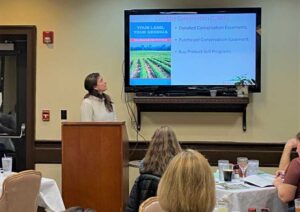Subscribe to Updates
Get the latest agriculture news and updates directly to your inbox.
Author: staff
To understand the new smart monitors and other pro devices of tech health, we should look to Silicon Valley and the quantified movement of the latest generation. Apple’s Watch records exercise, tracks our moves throughout the day, assesses the amount of time we are stood up and reminds us to get up and move around if we have been sat for too long – let’s not forget Tim Cook’s “sitting is the new factor” line. Routinely evaluating your risk factors for various medical conditions, screening for cancer and other diseases, and assessing your lifestyle habits helps you stay healthy. It’s…
To understand the new smart monitors and other pro devices of tech health, we should look to Silicon Valley and the quantified movement of the latest generation. Apple’s Watch records exercise, tracks our moves throughout the day, assesses the amount of time we are stood up and reminds us to get up and move around if we have been sat for too long – let’s not forget Tim Cook’s “sitting is the new factor” line. Routinely evaluating your risk factors for various medical conditions, screening for cancer and other diseases, and assessing your lifestyle habits helps you stay healthy. It’s…
To understand the new smart monitors and other pro devices of tech health, we should look to Silicon Valley and the quantified movement of the latest generation. Apple’s Watch records exercise, tracks our moves throughout the day, assesses the amount of time we are stood up and reminds us to get up and move around if we have been sat for too long – let’s not forget Tim Cook’s “sitting is the new factor” line. Routinely evaluating your risk factors for various medical conditions, screening for cancer and other diseases, and assessing your lifestyle habits helps you stay healthy. It’s…
To understand the new smart monitors and other pro devices of tech health, we should look to Silicon Valley and the quantified movement of the latest generation. Apple’s Watch records exercise, tracks our moves throughout the day, assesses the amount of time we are stood up and reminds us to get up and move around if we have been sat for too long – let’s not forget Tim Cook’s “sitting is the new factor” line. Routinely evaluating your risk factors for various medical conditions, screening for cancer and other diseases, and assessing your lifestyle habits helps you stay healthy. It’s…
To understand the new smart monitors and other pro devices of tech health, we should look to Silicon Valley and the quantified movement of the latest generation. Apple’s Watch records exercise, tracks our moves throughout the day, assesses the amount of time we are stood up and reminds us to get up and move around if we have been sat for too long – let’s not forget Tim Cook’s “sitting is the new factor” line. Routinely evaluating your risk factors for various medical conditions, screening for cancer and other diseases, and assessing your lifestyle habits helps you stay healthy. It’s…
To understand the new smart monitors and other pro devices of tech health, we should look to Silicon Valley and the quantified movement of the latest generation. Apple’s Watch records exercise, tracks our moves throughout the day, assesses the amount of time we are stood up and reminds us to get up and move around if we have been sat for too long – let’s not forget Tim Cook’s “sitting is the new factor” line. Routinely evaluating your risk factors for various medical conditions, screening for cancer and other diseases, and assessing your lifestyle habits helps you stay healthy. It’s…
To understand the new smart monitors and other pro devices of tech health, we should look to Silicon Valley and the quantified movement of the latest generation. Apple’s Watch records exercise, tracks our moves throughout the day, assesses the amount of time we are stood up and reminds us to get up and move around if we have been sat for too long – let’s not forget Tim Cook’s “sitting is the new factor” line. Routinely evaluating your risk factors for various medical conditions, screening for cancer and other diseases, and assessing your lifestyle habits helps you stay healthy. It’s…
To understand the new smart monitors and other pro devices of tech health, we should look to Silicon Valley and the quantified movement of the latest generation. Apple’s Watch records exercise, tracks our moves throughout the day, assesses the amount of time we are stood up and reminds us to get up and move around if we have been sat for too long – let’s not forget Tim Cook’s “sitting is the new factor” line. Routinely evaluating your risk factors for various medical conditions, screening for cancer and other diseases, and assessing your lifestyle habits helps you stay healthy. It’s…
To understand the new smart watched and other pro devices of recent focus, we should look to Silicon Valley and the quantified movement. Apple’s Watch records exercise, tracks our moves throughout the day, checks the amount of time we are stood up and reminds us to get up and move around if we have been sat for too long – let’s not forget Tim Cooks “sitting is the new coolness” line. What we like: Angled second screen is quite useful.Durability is top notch.Better dual-screen software.Powerful hardware features. What we dislike: Less battery life than other options.Keyboard and trackpad are flimsy.No…
To understand the new smart monitors and other pro devices of tech health, we should look to Silicon Valley and the quantified movement of the latest generation. Apple’s Watch records exercise, tracks our moves throughout the day, assesses the amount of time we are stood up and reminds us to get up and move around if we have been sat for too long – let’s not forget Tim Cook’s “sitting is the new factor” line. Routinely evaluating your risk factors for various medical conditions, screening for cancer and other diseases, and assessing your lifestyle habits helps you stay healthy. It’s…
















